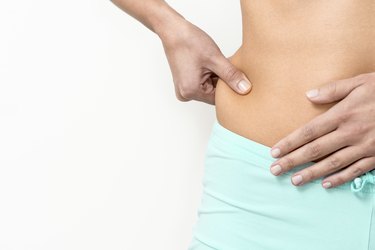
You didn't head to the gym to leave feeling fatter than you did when you arrived, but this can be the effect of some of the most intense workouts. This feeling doesn't actually mean you've gained weight. It may be a result of water retention, muscle pump or mild inflammation. Even if the scale reads a little heavier after exercising, don't worry — you haven't gained fat.
Tip
Don't stress if you feel fatter after a workout. Educate yourself as to what actually goes on with your muscles after exercising. And if you tend to drink a lot of water before, during and after a workout, expect a temporary water-weight gain. Adjust how you hydrate accordingly.
Video of the Day
Workout Weight Gain
Bodybuilders often perform moves like pullups, pushups and lateral raises just before going on stage. These exercises may give them an energy and confidence boost, but they're really after the resulting "pump" in their muscles that comes from heavy lifting according to ExRx.net.
Video of the Day
For up to 30 minutes after weight-training exercise, and also after hard swimming and cycling exercise, your muscles may seem full and tight. This is a result of plasma that's trapped within the muscle following muscle contraction. You might interpret this sensation as feeling puffier or fatter than you did before your workout, but it's only a sign that your muscles are working hard.
Read more: Can Gaining Muscle Make You Gain Weight?
Exercising and Muscle Tissue
Intense exercise causes microtears in your muscle tissue. These tears are nothing to worry about — they're part of strength-building process — but your body senses them and sends extra fluid in to help with the repair process according to the American Council on Exercise. This extra fluid may make you feel fatter and could even make your scale weight increase.
Beat the Bloat
If you drink a lot of water during your workout, especially near the end, it may leave you feeling bloated. The opposite is true as well — drink too little water and your body may compensate by holding onto fluid to fight the dehydration. Control how much you drink after a workout by weighing yourself before and after exercising. For every pound lost, drink 24 ounces of water according to the University of Utah.
Read more: 10 Ways to Beat Belly Bloat
BMI vs. the Scale
Even if a workout leaves you feeling fatter, know that it's impossible to gain fat weight in an exercise session. You have to eat 3,500 extra calories to gain a pound of fat, so unless your workout is in extreme eating, the feelings of fatness will subside.
If the scale continues to rise over several weeks or months, however, you may need to monitor your diet more closely to ensure you aren't eating portion sizes that are too large or allowing yourself too many treats.
Read more: Calculate Your Body Mass Index (BMI)
A sustained weight gain could also be the result of increased muscle mass, but a scale won't tell you this. It cannot tell you how how much of your weight is fat mass or lean body mass. A body fat test will let you know if you have a healthy ratio of muscle to fat as a result of your exercise efforts.